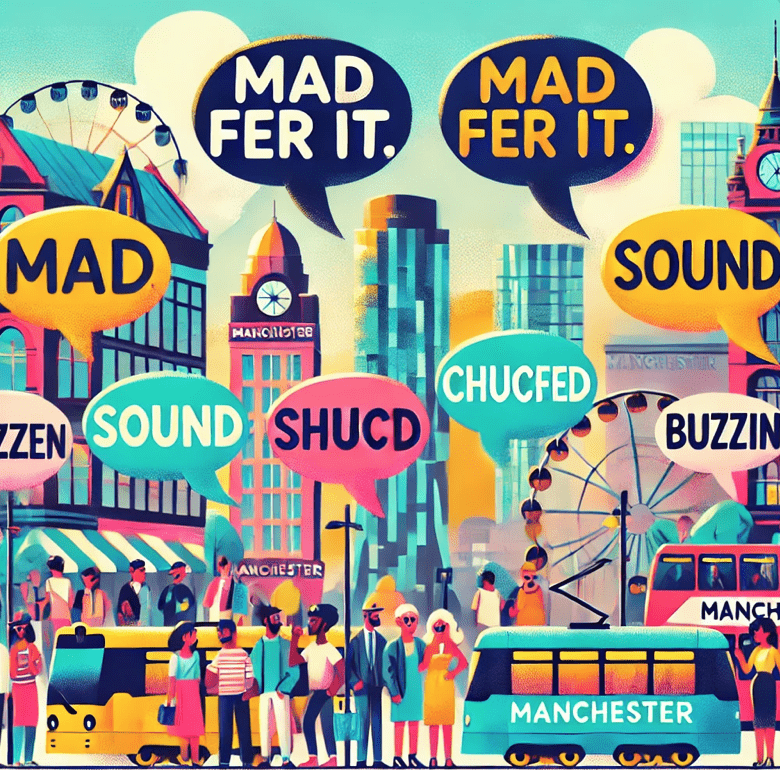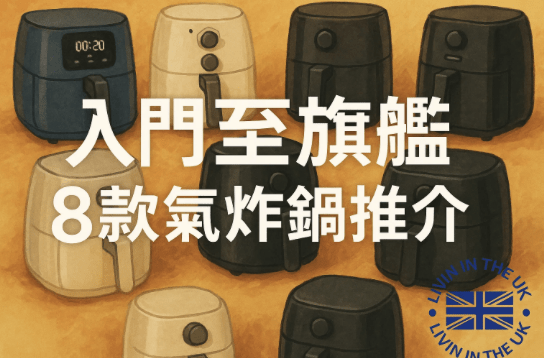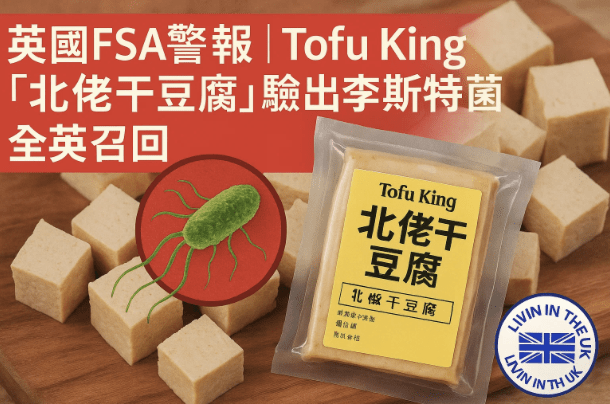
Manchester, like many cities in the UK, has its own unique slang that reflects its culture, history, and character. Below are 50 common slang words and phrases used in Manchester, along with their meanings, example sentences, and Chinese translations where appropriate. Many of these terms are also used in other parts of Northern England but are particularly associated with Manchester.
Top 50 Slang Words in Manchester
- Mint
- Meaning: Excellent, really good.
- Example: “That football match was mint!”
- Chinese: 超棒的
- Origin: Used across Northern England to describe something great.
- Sound
- Meaning: Good, okay, or reliable.
- Example: “He’s a sound guy.”
- Chinese: 不錯的,可靠的
- Origin: Widely used in Manchester to describe someone or something that’s decent.
- Mad fer it
- Meaning: Really enthusiastic, especially about partying or music.
- Example: “I’m mad fer it tonight!”
- Chinese: 超愛,特別興奮
- Origin: Made famous by Liam Gallagher of Oasis, it’s become a Mancunian catchphrase.
- Dead
- Meaning: Very or extremely.
- Example: “I’m dead tired.”
- Chinese: 非常,極度
- Origin: A common intensifier used in Manchester dialect.
- Ginnel
- Meaning: A narrow passage or alleyway.
- Example: “We walked down the ginnel to get home.”
- Chinese: 小巷
- Origin: Northern English term for an alleyway, particularly used in Manchester and Yorkshire.
- Chuffed
- Meaning: Really pleased or happy.
- Example: “I’m well chuffed with my new job.”
- Chinese: 高興,滿意
- Origin: British slang that’s common in Manchester, expressing satisfaction.
- Our kid
- Meaning: A term of endearment for a sibling or close friend.
- Example: “I’m going to the pub with our kid.”
- Chinese: 我兄弟或好友
- Origin: A Manchester term for referring to a sibling or mate.
- Belting
- Meaning: Really good, excellent.
- Example: “That was a belting performance.”
- Chinese: 非常棒的
- Origin: Common in Northern England, “belting” means something outstanding.
- Scran
- Meaning: Food.
- Example: “Let’s get some scran before the game.”
- Chinese: 食物
- Origin: Originally a military slang, now used in the North to refer to food.
- Mither
- Meaning: To bother or pester.
- Example: “Stop mithering me about it!”
- Chinese: 煩擾,打擾
- Origin: A Northern English term, often used to describe someone being a nuisance.
- Brew
- Meaning: A cup of tea.
- Example: “Fancy a brew?”
- Chinese: 一杯茶
- Origin: British slang, especially common in the North, referring to tea.
- Gaff
- Meaning: House or place.
- Example: “Come over to my gaff tonight.”
- Chinese: 房子
- Origin: Originally Irish slang, now widely used in Manchester to refer to someone’s home.
- Buzzin’
- Meaning: Excited or happy.
- Example: “I’m buzzin’ for the weekend!”
- Chinese: 興奮,期待
- Origin: Northern slang for being excited or thrilled.
- Skint
- Meaning: Broke, without money.
- Example: “I can’t go out, I’m skint.”
- Chinese: 沒錢的,窮的
- Origin: Common UK slang used to describe being out of money.
- Trolleyed
- Meaning: Extremely drunk.
- Example: “He got absolutely trolleyed last night.”
- Chinese: 醉到不行
- Origin: British slang for being very intoxicated.
- Fit
- Meaning: Attractive or good-looking.
- Example: “That lad is well fit.”
- Chinese: 好看的,帥的
- Origin: British slang for describing someone as physically attractive.
- Knackered
- Meaning: Very tired.
- Example: “I’m knackered after that shift.”
- Chinese: 筋疲力盡
- Origin: Common British slang for being exhausted, used across Manchester.
- Cheeky
- Meaning: Playfully rude or impudent.
- Example: “Fancy a cheeky pint after work?”
- Chinese: 調皮的,冒犯但有趣的
- Origin: Used across the UK, “cheeky” can describe something done playfully or mischievously.
- Kip
- Meaning: A nap or sleep.
- Example: “I’m off for a kip before heading out.”
- Chinese: 小睡
- Origin: Common UK slang for taking a short rest.
- Lad
- Meaning: A young man or male friend.
- Example: “That lad is a great football player.”
- Chinese: 年輕男孩或兄弟
- Origin: British term for a young man, widely used in Manchester.
- Bobbins
- Meaning: Rubbish, bad.
- Example: “That film was bobbins.”
- Chinese: 差勁的,糟糕的
- Origin: Northern slang for something of poor quality.
- Nesh
- Meaning: Someone who feels the cold easily.
- Example: “She’s nesh, always wrapping up even when it’s warm.”
- Chinese: 怕冷的
- Origin: A Northern English word, particularly common in Manchester and Yorkshire.
- Daft
- Meaning: Silly or foolish.
- Example: “Don’t be daft, of course you can do it.”
- Chinese: 愚蠢的,傻的
- Origin: British slang used to describe someone acting in a silly way.
- Do one
- Meaning: Go away, get lost.
- Example: “If you’re going to be like that, do one.”
- Chinese: 走開,滾開
- Origin: Common phrase in Manchester for telling someone to leave.
- Nowt
- Meaning: Nothing.
- Example: “I’ve got nowt to do today.”
- Chinese: 沒什麼
- Origin: Northern English term for “nothing.”
- Owt
- Meaning: Anything.
- Example: “Do you need owt from the shop?”
- Chinese: 任何東西
- Origin: Opposite of “nowt,” used in Northern England to mean “anything.”
- Barmy
- Meaning: Crazy or mad.
- Example: “He’s barmy if he thinks that’ll work.”
- Chinese: 瘋狂的
- Origin: British slang for someone who’s a bit mad or eccentric.
- Offie
- Meaning: An off-licence (liquor store).
- Example: “I’m popping to the offie to grab some beers.”
- Chinese: 酒店(賣酒的店)
- Origin: Short for “off-licence,” meaning a shop that sells alcohol.
- Manc
- Meaning: A person from Manchester.
- Example: “He’s a proper Manc.”
- Chinese: 曼徹斯特人
- Origin: Short for “Mancunian,” referring to someone from Manchester.
- Gutted
- Meaning: Very disappointed.
- Example: “I was gutted when we lost the game.”
- Chinese: 失望的
- Origin: British slang, widely used across the UK.
- Bevvy
- Meaning: A drink, usually alcoholic.
- Example: “Fancy a bevvy after work?”
- Chinese: 酒水,飲料
- Origin: Short for “beverage,” commonly referring to alcohol.
- Mancunian Way
- Meaning: The specific way people from Manchester behave or speak.
- Example: “He’s got that Mancunian Way about him.”
- Chinese: 曼徹斯特人的方式
- Origin: Refers to the culture and attitude of Manchester residents.
- Radged
- Meaning: Angry or worked up.
- Example: “He went radged when he found out.”
- Chinese: 生氣,暴怒
- Origin: Northern slang for someone who’s extremely angry.
- Snide
- Meaning: Fake, dishonest.
- Example: “That bag looks a bit snide.”
- Chinese: 假的,不誠實的
- Origin: British slang used to describe something counterfeit or deceitful.
- Scally
- Meaning: A troublemaker or petty criminal.
- Example: “He’s just a scally from down the road.”
- Chinese: 惡棍,小混混
- Origin: A term for a person who engages in petty crime or anti-social behavior.
- Bunk
- Meaning: To skip school or work.
- Example: “We bunked off school and went to the park.”
- Chinese: 翹課
- Origin: Common British slang for avoiding school or work.
- Pegs
- Meaning: Teeth.
- Example: “She’s got lovely pegs.”
- Chinese: 牙齒
- Origin: Mancunian slang for teeth.
- Blag
- Meaning: To deceive or con.
- Example: “He blagged his way into the club.”
- Chinese: 欺騙,蒙混過關
- Origin: British slang for tricking or deceiving someone.
- The Big Smoke
- Meaning: London.
- Example: “We’re off to the Big Smoke this weekend.”
- Chinese: 倫敦
- Origin: A nickname for London, referring to its industrial history.
- Clobber
- Meaning: Clothing.
- Example: “I got some new clobber for the party.”
- Chinese: 衣服
- Origin: British slang for clothes, often used in Manchester.
- Dodgy
- Meaning: Unreliable or suspicious.
- Example: “That guy looks a bit dodgy.”
- Chinese: 可疑的
- Origin: British slang for something or someone that seems untrustworthy.
- Faff
- Meaning: To waste time or procrastinate.
- Example: “Stop faffing around and get to work.”
- Chinese: 浪費時間
- Origin: British slang for dithering or wasting time on unimportant things.
- Gagging
- Meaning: Desperate or eager.
- Example: “I’m gagging for a drink.”
- Chinese: 迫切的,渴望的
- Origin: British slang used to describe a strong desire for something.
- Throw a wobbler
- Meaning: To have a temper tantrum.
- Example: “He threw a wobbler when he lost the match.”
- Chinese: 發脾氣
- Origin: British slang for someone losing their temper.
- Sorted
- Meaning: Fixed or resolved.
- Example: “Don’t worry, it’s all sorted now.”
- Chinese: 解決了
- Origin: Common British slang for saying something has been taken care of.
- Bagsy
- Meaning: To claim something first.
- Example: “Bagsy the front seat!”
- Chinese: 優先佔領
- Origin: British children’s slang for calling dibs on something.
- Manc
- Meaning: Someone from Manchester.
- Example: “He’s a proud Manc.”
- Chinese: 曼徹斯特人
- Origin: Short for Mancunian, meaning someone from Manchester.
- Proper
- Meaning: Really or very.
- Example: “That’s proper good, mate!”
- Chinese: 非常,真正的
- Origin: Common in Northern England, especially in Manchester, to emphasize something.
- On it like a car bonnet
- Meaning: Ready or eager to do something.
- Example: “Are you coming out tonight?” “I’m on it like a car bonnet!”
- Chinese: 準備好了,積極的
- Origin: A playful British phrase, particularly popular in Northern England.
- Having a mare
- Meaning: Having a bad day or a difficult time.
- Example: “I’ve been having a mare at work today.”
- Chinese: 遇到困難,倒霉
- Origin: Short for “nightmare,” it’s common in British slang to describe a tough situation.
This list includes a mix of old and newer slang terms heard in Manchester. Some are uniquely “Manc,” while others are widely used across Northern England. Understanding these slang words can help you feel more integrated into Manchester’s rich, vibrant culture!
請加入livinintheuk.com的WhatsApp廣播名單,並參考英國的房地產列表。此外,加入我們的WhatsApp群組,隨時幫你搜羅最抵嘅優惠及亞馬遜交易!加入我們的Facebook群組,與更多關心此事的人一起交流。






